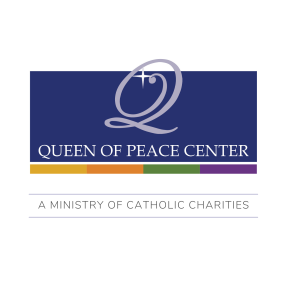Kristy's Story
A smiling Kristy Pomirko, bubbly and chatty, turns serious when assessing the impact Queen of Peace Center had on her.
"I'm very thankful. Without Queen of Peace Center, I would not be sitting here today. I'd either be in jail, an institution (prison) or dead," she said.
Queen of Peace Center, a Catholic Charities agency, is a family-centered behavioral health care provider for women with addiction, their children and families. The recovery center provides a variety of treatment options to women with co-occurring disorders and those affected by trauma.
Pomirko began using drugs at age 16, influenced by peer pressure. "It really is that easy," she said.
When she learned she was pregnant in 2012 at age 28, "I didn't know what to do," she said. "It was hard. I knew a certain way of life and was doing it so long."
Her mother referred her to Queen of Peace Center where she received treatment, room and board, childbirth education programs and much more. She'd been in other treatment centers, none as comprehensive as Queen of Peace Center, and had returned to drugs each time. This time she was determined to stop. It wasn't just about her but was about a "living being who can't make a choice. I brought him here, he's now living inside me. What kind of person would I be if I kept putting drugs in me and maybe kill him?"
Though it isn't easy, people with addictions can change, said Pomirko, who mainly used heroin and crack. "The majority of us need a program to follow. That's what Queen of Peace Center does. It gives you a program, keeps you busy and provides a lot of resources to help you get back on your feet, find a job. They don't just throw you out to the cold. They give you a place to stay, stability, security, counselors to talk to, group counseling. You're not dealing with this on your own."
Pomirko had been jailed several times and had two stints in prison, one for 7 months and the other 14 months. Upon release, she said, "they throw you back out to the street. Some places you get treatment, but a lot of times you can get a home plan and all you need is an address. 'The bus is coming at 6, bye.' They throw clothes on you out of a box and you're done."
The single mom of a 4-year-old born healthy thanks to Queen of Peace Center now works and is looking to return to school. Stressors continue, but the Our Lady of Sorrows parishioner said "God will provide. I'm big on church. I believe there's a power greater than ourselves. All the times I survived the streets and shouldn't have. I should have been dead many times. By the grace of God I just wasn't."
Dr. David Glick sees mothers in such physical and psychiatric distress from their drug use that they struggle with effective parenting. However, with medication-assisted therapy added to counseling therapies, parenting skills assistance and other efforts, the women can become functional parents and productive citizens.
Glick is a board-certified family medicine physician at Family Care Health Centers in St. Louis who attended St. Louis University School of Medicine. Since about 2008, he's been taking care of patients with heroin and opiate addictions at the primary care clinic where he works for substance-abuse problems. The physician prescribes suboxone, which limits withdrawal symptoms and decreases the frequency and intensity of cravings in the person addicted to opiates. Its levels can be monitored and reduced until the person is no longer addicted.
He was familiar with the services Queen of Peace Center offers, and "it became extremely clear to me that the burden of heroin and opiate addiction among the clients here at Queen of Peace Center was a massive problem," Glick said. The staff at the center hadn't offered medication-assisted therapy for patients suffering from heroin or opiate withdrawal or receiving treatment for the addiction while living at the center after withdrawal. Pomirko was an exception because she was seeing a doctor for her pregnancy.
Queen of Peace Center received a grant to cover costs of helping Glick begin treatment with medication that is becoming the standard of care for opiate addiction. "It allows women with heroin addiction to have access to a very effective therapy immediately when they enroll in the outpatient program here or the 21-day residential program," said Glick, who began work at the center twice a week in September.
Queen of Peace Center is a rare program to offer comprehensive services for a woman with addictions while focused on its impact on the family structure. "It's really a family disease," Glick said. "I regularly will see a woman with a young child, both of whom are living at the center for a time. ... so the mother can continue to engage in healthy parenting behaviors at the same time they are receiving treatment for their addiction."
The process takes a long time, but small changes occur quickly with the medication-assisted therapy. Their stay at the center typically is short, but the follow-up is extensive. The center also has a housing component and social services.
"It's remarkable when it goes well, and it fills me with great joy," Glick said.
The medical community now recognizes that addictions are chronic, long-term illnesses that need to be managed similar to diabetes or high blood pressure, the physician said. "Families sometimes misunderstand, thinking that after 21 days of residential treatment their loved one is going to come out and be cured," Glick said. "That's generally not the case. It takes years of hard work, and relapse is part of the process of addiction."
http://stlouisreview.com/article/2016-12-22/queen-peace-center-s
All content copyright (©) 2016 Saint Louis Review. All Rights Reserved.
